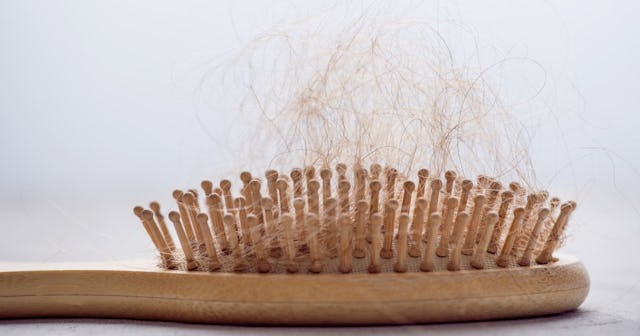Keep Calm And Carry On With This Expert Advice On Postpartum Hair Loss

You made it through the weird little idiosyncrasies of pregnancy (hello, mucus plug) and managed to successfully birth a whole human being. Congrats are definitely in order. Now there are other hormone-related quirks to contend with, though, and one of them is postpartum hair loss. Ah, pregnancy — it’s the gift that keeps on giving!
Post-childbirth, your attention has likely shifted to keeping that tiny human alive, as it should be. But that also means you may have blinders on to the fact that your body has a few more pregnancy-related tricks up its sleeve. So, at some point, when your brain isn’t spinning in twelve different directions about your new baby nugget, you might stop and wonder, Why is my hair thinning? Or, since your hormones are still raging and you may be feeling a bit alarmist between that and your new-mama-nerves, Am I going bald?!
Calm down, Mama. We chatted with Beverly Hills-based board-certified medical and cosmetic dermatologist Dr. Ohara Aivaz to bring you some reassurance that what you’re going through is totally natural. Here’s her take on this post-pregnancy phenomenon.
When does postpartum hair loss typically start?
This shedding of hair begins anywhere between one to five months after childbirth and affects about 50 percent of women, according to Dr. Aivaz.
Why does your hair fall out after pregnancy?
Prepare to get your science-nerd on, because the reason your hair is falling out post-pregnancy actually has a fascinating biological background. “To understand why this happens, it is helpful to review the normal cycle of hair growth. Our hair follicles go through three stages: anagen phase (this is the growth of hair), followed by the catagen phase (resting phase), and lastly telogen (the shedding phase). As the hairs go through this cycle, each hair on the scalp is replaced every three to five years,” explained Dr. Aivaz.
She continued, connecting the dots to postpartum hair loss: “During pregnancy, the high prolactin, estrogen, and progesterone hormone levels shift all of our hairs into the growing phase (anagen phase). This explains why pregnant women have thick, voluminous hair — because they don’t shed hair during the pregnancy! Because no hairs are in telogen phase during pregnancy, no hair is shed during pregnancy. After pregnancy, as the hormone levels normalize, a lot of those hairs that had shifted into the active phase now are shifted into the telogen phase, which allows the hair to shed and return to its normal cycle. The normal hair loss that was halted during pregnancy occurs all at once, resulting in the massive shedding that some women experience.”
Hence the condition formally being known as telogen effluvium — telogen for the hair cycle phase and effluvium, which means “an invisible emanation.”
Is there anything you can do to limit postpartum hair loss?
Well, an important first point to make is that telogen effluvium isn’t technically hair loss; it’s hair shedding. Unlike permanent conditions such as alopecia areata, postpartum hair loss is temporary. “While seeing your hair shedding so much can be scary, the good news is that complete hair regrowth is expected!” reassured Dr. Aivaz. If you have long or naturally thick hair, this news should be comforting — even if it looks like a small kitten is clogging your drain after every shower.
A healthy, well-balanced diet and gentle-to-moderate exercise regiment may also help minimize the effects of postpartum hair loss by encouraging overall recovery.
What can you do to camouflage the fact your hair is thinning?
You may have just pulled your hair into a messy bun for most of your pregnancy, but you might have to log more hair maintenance now. “To camouflage hair loss, use volumizing shampoos and avoid heavy conditioners that weigh hair down,” Dr. Aivaz recommended. “Ask your hairstylist to help you choose a cut that makes the hair look full.”
But also, it might be time to consider vitamins to help with postpartum hair loss. Dr. Aivaz’s suggestion? Talk to your doctor about supplements like vitamin D, vitamin B, iron, zinc and biotin that may help with postpartum hair loss by stimulating growth. She noted, “There are also hair-specific vitamins like Viviscal Professional and Nutrafol, which can be helpful during telogen effluvium. Check with your doctor before starting these, especially if you are breastfeeding.”
How long does postpartum hair loss last?
Fortunately, this strange side effect does end. “The shedding typically resolves on its own after six to eight months, and you can expect a normal head of hair at the little one’s first birthday,” said Dr. Aivaz.
When should you seek postpartum hair loss help?
Of course, it’s human nature (and especially new mama nature) to wonder when it might be time to worry. If you’re exhibiting severe postpartum hair loss, reach out to a health care provider. “No treatment is needed for postpartum telogen effluvium as it is a the body’s natural response to hormone fluctuations, and it is self-resolving,” explained Dr. Aivaz, noting a caveat. “If the hair loss lasts beyond one year, a visit to the dermatologist is a good idea to rule out other causes of hair loss.”
Written by Julie Sprankles.
Read More:
Sex After Birth: The Ins And Outs Of Getting It On After Baby
We’re Losing Our Hair After Giving Birth But These Treatments Can Really Help
This article was originally published on